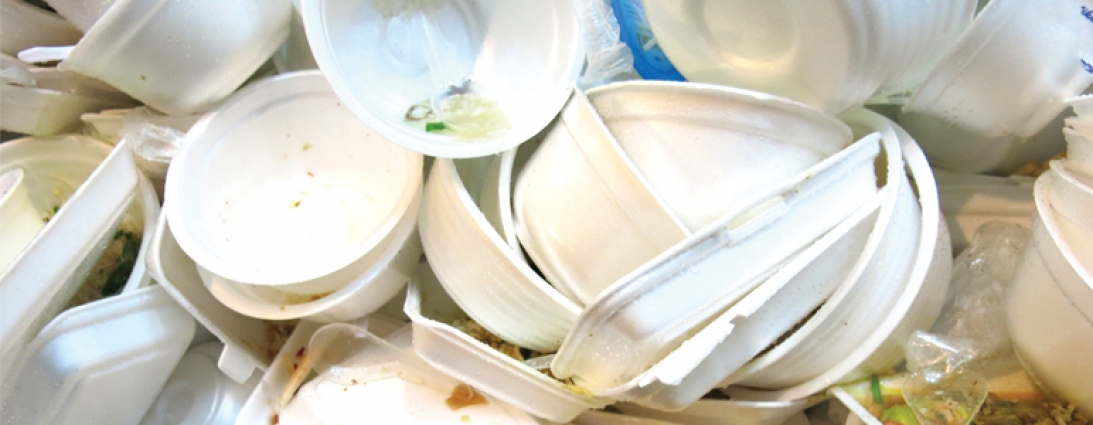

Restaurants and retail food vendors can switch from plastic foam food and beverage containers to more environmentally friendly products without incurring a substantial financial burden for their businesses or customers, according to a new report by the Equinox Project at the Center for Sustainable Energy (CSE).
The report provides an analysis of several municipal policies regarding such nonbiodegradable food service products and offers a roadmap for jurisdictions to establish ordinances to reduce or eliminate their use.
CSE examined the environmental and economic impacts of single-use food containers made of expanded polystyrene, commonly but incorrectly known as Styrofoam™. The use of polystyrene food packaging has been banned in some U.S. cities and the movement to reduce its use is growing among consumers and policymakers. According to the report, Recommendations for Reducing or Banning Foam Food Service Containers, the vast majority of polystyrene food containers are used once and discarded, ending up as landfill trash or as litter in sensitive areas like in rivers, lakes and the ocean.
View and download the infographic "Guide for Polystyrene Reduction Policies"
“Nationwide, billions of these containers and cups create hundreds of thousands of tons of waste each year, and due to their ubiquitous use, frequently enter the environment as litter where they break down into smaller and smaller pieces that last for decades and are easily ingested by terrestrial and marine animals,” Michael Torti, Surfrider Foundation San Diego County Chapter executive board member and policy advocate for the Rise Above Plastics campaign.
Polystyrene reduction policies have been enacted by the District of Columbia and cities in 10 states, including California, Florida, Maine, Maryland, Massachusetts, New Jersey, New York, Oregon, Texas and Washington. California leads with 99 cities adopting some form of polystyrene ordinance. In 2011, a proposed California statewide ban was approved by the Senate, but failed to pass the Assembly.
The CSE report focuses on data from environmental groups, industry associations and government agencies and includes analysis of existing municipal policies in California and other West Coast cities. It examines how banning polystyrene might affect restaurant pricing and consumer costs and offers solutions to overcome financial barriers.
“When it comes to the costs related to banning polystyrene food containers, you have to first consider the current costs of its use when it comes to disposing trash and cleaning up the litter,” said Mikaela Bolling, CSE’s Equinox project manager. “Before passage of its citywide polystyrene ordinance, Seattle studied its environmental impacts and found they were spending around $620,000 a year to clean up, collect and dispose or recycle such food service items.”
CSE compared cost differences for polystyrene food service items and their alternatives made of recyclable plastics or paper. The differences ranged from one cent for eight-ounce cups to three cents for nine-inch plates and eight cents for takeout containers. An analysis of pass-along costs for restaurants to make up the difference in packaging prices showed consumers paying as little as one-half percent more for a $2 beverage and under one percent more for a $10 entree item.
In a 2011 study conducted by Cascadia Consulting Group for Milpitas, Calif., residents were polled to gauge if they would support a business that had to increase their prices to comply with a polystyrene ban, 50 percent stated they would do so with only 23 percent saying they would not. A survey by Surfrider San Diego found that 87 percent of respondents said they would view a business more favorably for using environmentally friendly takeout containers.
The beachfront city of Encinitas is the most recent California municipality to pass an ordinance banning polystyrene food container use by restaurants in November 2016. It administers a $100 fine for first-time offenders and $200 thereafter. The neighboring city of Solana Beach passed a ban in 2015.
“Plastic bags and EPS have only a short-term benefit that comes at the cost of long-term degradation to our beaches, oceans and wildlife,” said James Wang, environmental commissioner for Encinitas. “Hopefully, other jurisdictions share Encinitas’ appreciation for nature and the accompanying responsibility to care for it. Thanks to the Equinox Project for this report, and for spreading to word about the egregious environmental cost of plastics.
Bolling said several options exist to make the transition from polystyrene to other materials easier for restaurants and food service locations at universities, hospitals and other institutions.
One approach is through organized bulk purchasing by chain outlets or among neighboring businesses, a cost-effective strategy already widely used in the restaurant industry. Another is to promote reduction ordinances or bans that include exemptions for food vendors who may not have access to polystyrene alternatives or do not have the necessary profit margin to incur the extra costs, as is the case with the polystyrene food service ware prohibition in San Jose, Calif.
CSE makes nine recommendations for jurisdictions considering polystyrene food container bans or reduction ordinances, ranging from evaluating whether specific alternatives will be required to conducting pre- and post-ordinance litter audits. For areas not considering ordinances, they recommend efforts to limit environmental impacts of polystyrene food ware by supporting and incentivizing voluntary reduction programs, informing restaurants about alternative materials and educating consumers on the long-term effects of polystyrene in the environment to encourage behavioral changes to not litter.
Research for the paper was underwritten by a grant from Patagonia Cardiff. CSE is an independent, nonprofit organization headquartered in San Diego that provides program design and management, policy guidance, education and research related to clean energy market development and transformation.
